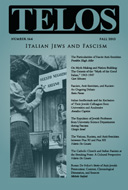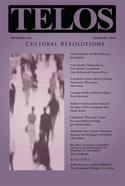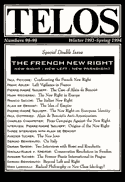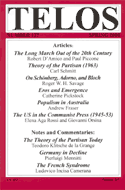By Franklin Hugh Adler · Monday, September 23, 2013 Telos 164 (Summer 2013) is now available for purchase in our store.
 When we examine European anti-Semitism during the 1930s, and especially the Shoah, the case of Germany looms so large that the Nazi regime immediately appears as the paradigmatic form of fascism and the manifold policies directed against European Jewry during the 1930s little more than German racial policy writ large. Without in any way trivializing or, worse, relativizing in an ethical sense the German case, one might nevertheless suggest that it occupies too much conceptual space and occludes a more precise comparative understanding of other European cases where anti-Semitic policies had been autonomously generated, relatively independent of direct Nazi pressure. In this sense, decentering the German case might be a necessary first step toward a less encumbered perspective on what happened elsewhere. When we examine European anti-Semitism during the 1930s, and especially the Shoah, the case of Germany looms so large that the Nazi regime immediately appears as the paradigmatic form of fascism and the manifold policies directed against European Jewry during the 1930s little more than German racial policy writ large. Without in any way trivializing or, worse, relativizing in an ethical sense the German case, one might nevertheless suggest that it occupies too much conceptual space and occludes a more precise comparative understanding of other European cases where anti-Semitic policies had been autonomously generated, relatively independent of direct Nazi pressure. In this sense, decentering the German case might be a necessary first step toward a less encumbered perspective on what happened elsewhere.
Continue reading →
By Telos Press · Monday, September 16, 2013 Karel Kosík and Dialectics of the Concrete Prague, June 4–6, 2014
A conference organised by the Department for the Study of Modern Czech Philosophy, Institute of Philosophy, Academy of Sciences of the Czech Republic.
In 1963 Karel Kosík published his path-breaking book Dialectics of the Concrete. It made an impact on both Marxist and non-Marxist thinkers, in Czechoslovakia and throughout the world. In this work Kosík set for himself an ambitious task—to re-think the basic concepts of the Marxist philosophical tradition and to employ them in the analysis of social reality. In the course of his analysis he touched on a wide array of issues that are still relevant today, including the problem of mystification or the “pseudo-concrete,” the social role of art, the conception of reality as a concrete totality, the conception of the human being as an onto-formative being, the systematic connection between labour and temporality, the relationship between praxis and labour, and the explanatory power of the dialectical method.
Continue reading →
By Greg Melleuish and Susanna Rizzo · Friday, September 13, 2013 Greg Melleuish and Susanna Rizzo’s “From Secular Temporality to Post-Secular Timelessness: Trekking the Past’s Future and Future’s Past” appears in Telos 163 (Summer 2013). Read the full version online at the Telos Online website, or purchase a print copy of the issue in our store.
 This essay is built on the assumption that History is as much about the future as it is about the past and that there is a “politics of history” that determines the relationship of the past to the present and the future. The secularization thesis created a model of history in which human beings passed from a condition in which they were religious, primitive, and querulous to one in which they were moving toward a world that would be not only secular but also peaceful. At the same time, the end of History can be understood in eschatological terms in which we are always at the end of days waiting for the purging that will allow the purpose of History to be fulfilled. The return of religion destroys this narrative and allows others to return, including History as irony and the possibility of the story as a denial of History. Post-secular History reflects both the crumbling of this once certain narrative and the legitimacy of the modern state that was built on that narrative. It is a crisis of authority, as can be seen in the proliferation of views and ideas that can be found on the world wide web, and the seeming erosion of the capacity of historians to control History and structure its narratives. This essay is built on the assumption that History is as much about the future as it is about the past and that there is a “politics of history” that determines the relationship of the past to the present and the future. The secularization thesis created a model of history in which human beings passed from a condition in which they were religious, primitive, and querulous to one in which they were moving toward a world that would be not only secular but also peaceful. At the same time, the end of History can be understood in eschatological terms in which we are always at the end of days waiting for the purging that will allow the purpose of History to be fulfilled. The return of religion destroys this narrative and allows others to return, including History as irony and the possibility of the story as a denial of History. Post-secular History reflects both the crumbling of this once certain narrative and the legitimacy of the modern state that was built on that narrative. It is a crisis of authority, as can be seen in the proliferation of views and ideas that can be found on the world wide web, and the seeming erosion of the capacity of historians to control History and structure its narratives.
Continue reading →
By Beau Mullen · Tuesday, September 10, 2013 As an occasional feature on TELOSscope, we highlight a past Telos article whose critical insights continue to illuminate our thinking and challenge our assumptions. Today, Beau Mullen looks at Alain de Benoist’s “The Idea of Empire,” from Telos 98–99 (Winter 1993/Spring 1994).
 Few political concepts have appeared as destined to be cast into history’s dustbin as that of empire. The nation-state is the most widely accepted model for sovereign territories, and imperial ambitions of nations are often condemned by the international community. The existence of great empires, such as that of the Romans or of the Holy Roman Empire, it appears, are simply regimes that are relics of a distant, less enlightened historical era. The areas once encompassing the great empires have now fractured into sovereign nation-states, each with its own polity and allegiances. Furthermore, serious modern confederation between nations is most often based on monetary concerns, not the furtherance of any imperial goal or ambition. The sun, it could be said, has set on the idea of empire. Few political concepts have appeared as destined to be cast into history’s dustbin as that of empire. The nation-state is the most widely accepted model for sovereign territories, and imperial ambitions of nations are often condemned by the international community. The existence of great empires, such as that of the Romans or of the Holy Roman Empire, it appears, are simply regimes that are relics of a distant, less enlightened historical era. The areas once encompassing the great empires have now fractured into sovereign nation-states, each with its own polity and allegiances. Furthermore, serious modern confederation between nations is most often based on monetary concerns, not the furtherance of any imperial goal or ambition. The sun, it could be said, has set on the idea of empire.
Continue reading →
By Paolo Morisi · Friday, August 30, 2013 Paolo Morisi’s “Twentieth-Century British Christian Democratic Movements: The Search for a Political Space” appears in Telos 163 (Summer 2013). Read the full version online at the Telos Online website, or purchase a print copy of the issue in our store.
 One of the major British political anomalies vis-à-vis Europe is the lack of a Christian Democratic political party. In most European countries these parties are part of the political fabric of the nation, but in Britain Christian Democracy never developed into a party. Research has shown that during the twentieth century there were British groups that inspired by Catholic social thought were the closest approximation to Christian Democracy. They not only sought to influence the parties, but also introduced into domestic politics typical Christian Democratic concerns. Thus, this essay seeks to address the following questions: What were their aims and policies? How and in what ways did they influence the parties? What was their ideological outlook? Finally, were there ideological differences among these groups? One of the major British political anomalies vis-à-vis Europe is the lack of a Christian Democratic political party. In most European countries these parties are part of the political fabric of the nation, but in Britain Christian Democracy never developed into a party. Research has shown that during the twentieth century there were British groups that inspired by Catholic social thought were the closest approximation to Christian Democracy. They not only sought to influence the parties, but also introduced into domestic politics typical Christian Democratic concerns. Thus, this essay seeks to address the following questions: What were their aims and policies? How and in what ways did they influence the parties? What was their ideological outlook? Finally, were there ideological differences among these groups?
Continue reading →
By Johannes Grow · Tuesday, August 27, 2013 As an occasional feature on TELOSscope, we highlight a past Telos article whose critical insights continue to illuminate our thinking and challenge our assumptions. Today, Johannes Grow looks at Pierluigi Mennitti’s “Germany in Decline,” from Telos 127 (Spring 2004).
 In “Germany in Decline,” from Telos 127 (Spring 2004), Pierluigi Mennitti addresses Berlin’s inability to enact “true” reforms, which has subsequently led to a decline in its economic, geopolitical, and cultural influence. Through an examination of a contemporaneous Der Spiegel article, Mennitti demonstrates the reluctance of the Federal Republic to accept such thoroughgoing Reformen, which would allow it to crawl out of its then apparent decline and to depend far less on the economic strategies propounded during the so-called “economic miracle” of the post-1949 era. Although it would seem to have been premature to write off Germany as the “economic engine” in Europe, his article nevertheless offers several accurate points. For example, Mennitti asserts that Germany In “Germany in Decline,” from Telos 127 (Spring 2004), Pierluigi Mennitti addresses Berlin’s inability to enact “true” reforms, which has subsequently led to a decline in its economic, geopolitical, and cultural influence. Through an examination of a contemporaneous Der Spiegel article, Mennitti demonstrates the reluctance of the Federal Republic to accept such thoroughgoing Reformen, which would allow it to crawl out of its then apparent decline and to depend far less on the economic strategies propounded during the so-called “economic miracle” of the post-1949 era. Although it would seem to have been premature to write off Germany as the “economic engine” in Europe, his article nevertheless offers several accurate points. For example, Mennitti asserts that Germany
Continue reading →
|
|
 When we examine European anti-Semitism during the 1930s, and especially the Shoah, the case of Germany looms so large that the Nazi regime immediately appears as the paradigmatic form of fascism and the manifold policies directed against European Jewry during the 1930s little more than German racial policy writ large. Without in any way trivializing or, worse, relativizing in an ethical sense the German case, one might nevertheless suggest that it occupies too much conceptual space and occludes a more precise comparative understanding of other European cases where anti-Semitic policies had been autonomously generated, relatively independent of direct Nazi pressure. In this sense, decentering the German case might be a necessary first step toward a less encumbered perspective on what happened elsewhere.
When we examine European anti-Semitism during the 1930s, and especially the Shoah, the case of Germany looms so large that the Nazi regime immediately appears as the paradigmatic form of fascism and the manifold policies directed against European Jewry during the 1930s little more than German racial policy writ large. Without in any way trivializing or, worse, relativizing in an ethical sense the German case, one might nevertheless suggest that it occupies too much conceptual space and occludes a more precise comparative understanding of other European cases where anti-Semitic policies had been autonomously generated, relatively independent of direct Nazi pressure. In this sense, decentering the German case might be a necessary first step toward a less encumbered perspective on what happened elsewhere.  This essay is built on the assumption that History is as much about the future as it is about the past and that there is a “politics of history” that determines the relationship of the past to the present and the future. The secularization thesis created a model of history in which human beings passed from a condition in which they were religious, primitive, and querulous to one in which they were moving toward a world that would be not only secular but also peaceful. At the same time, the end of History can be understood in eschatological terms in which we are always at the end of days waiting for the purging that will allow the purpose of History to be fulfilled. The return of religion destroys this narrative and allows others to return, including History as irony and the possibility of the story as a denial of History. Post-secular History reflects both the crumbling of this once certain narrative and the legitimacy of the modern state that was built on that narrative. It is a crisis of authority, as can be seen in the proliferation of views and ideas that can be found on the world wide web, and the seeming erosion of the capacity of historians to control History and structure its narratives.
This essay is built on the assumption that History is as much about the future as it is about the past and that there is a “politics of history” that determines the relationship of the past to the present and the future. The secularization thesis created a model of history in which human beings passed from a condition in which they were religious, primitive, and querulous to one in which they were moving toward a world that would be not only secular but also peaceful. At the same time, the end of History can be understood in eschatological terms in which we are always at the end of days waiting for the purging that will allow the purpose of History to be fulfilled. The return of religion destroys this narrative and allows others to return, including History as irony and the possibility of the story as a denial of History. Post-secular History reflects both the crumbling of this once certain narrative and the legitimacy of the modern state that was built on that narrative. It is a crisis of authority, as can be seen in the proliferation of views and ideas that can be found on the world wide web, and the seeming erosion of the capacity of historians to control History and structure its narratives.  Few political concepts have appeared as destined to be cast into history’s dustbin as that of empire. The nation-state is the most widely accepted model for sovereign territories, and imperial ambitions of nations are often condemned by the international community. The existence of great empires, such as that of the Romans or of the Holy Roman Empire, it appears, are simply regimes that are relics of a distant, less enlightened historical era. The areas once encompassing the great empires have now fractured into sovereign nation-states, each with its own polity and allegiances. Furthermore, serious modern confederation between nations is most often based on monetary concerns, not the furtherance of any imperial goal or ambition. The sun, it could be said, has set on the idea of empire.
Few political concepts have appeared as destined to be cast into history’s dustbin as that of empire. The nation-state is the most widely accepted model for sovereign territories, and imperial ambitions of nations are often condemned by the international community. The existence of great empires, such as that of the Romans or of the Holy Roman Empire, it appears, are simply regimes that are relics of a distant, less enlightened historical era. The areas once encompassing the great empires have now fractured into sovereign nation-states, each with its own polity and allegiances. Furthermore, serious modern confederation between nations is most often based on monetary concerns, not the furtherance of any imperial goal or ambition. The sun, it could be said, has set on the idea of empire.  In “Germany in Decline,” from Telos 127 (Spring 2004), Pierluigi Mennitti addresses Berlin’s inability to enact “true” reforms, which has subsequently led to a decline in its economic, geopolitical, and cultural influence. Through an examination of a contemporaneous Der Spiegel article, Mennitti demonstrates the reluctance of the Federal Republic to accept such thoroughgoing Reformen, which would allow it to crawl out of its then apparent decline and to depend far less on the economic strategies propounded during the so-called “economic miracle” of the post-1949 era. Although it would seem to have been premature to write off Germany as the “economic engine” in Europe, his article nevertheless offers several accurate points. For example, Mennitti asserts that Germany
In “Germany in Decline,” from Telos 127 (Spring 2004), Pierluigi Mennitti addresses Berlin’s inability to enact “true” reforms, which has subsequently led to a decline in its economic, geopolitical, and cultural influence. Through an examination of a contemporaneous Der Spiegel article, Mennitti demonstrates the reluctance of the Federal Republic to accept such thoroughgoing Reformen, which would allow it to crawl out of its then apparent decline and to depend far less on the economic strategies propounded during the so-called “economic miracle” of the post-1949 era. Although it would seem to have been premature to write off Germany as the “economic engine” in Europe, his article nevertheless offers several accurate points. For example, Mennitti asserts that Germany 

